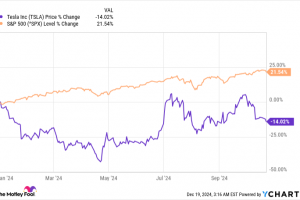
NVDA shares could notch $800 each by 2030, former BCG exec Phillip Panaro predicted.Chelsea Jia Feng/BI
Nvidia could rocket another 545% by the end of the decade, Phil Panaro predicted.
The former BCG executive said the firm will soar due to the AI revolution & transition to Web3.
The stock could also see a “huge explosion” in 2025 after the release of Blackwell, he said.
Nvidia is headed for a meteoric run-up by the end of the decade, according to one former consulting exec.
Phil Panaro — a former senior advisor at Boston Consulting Group who also served as CEO of a BCG subsidiary — says shares of the AI chipmaker will reach $800 by 2030. That implies another 545% upside for the stock, which traded around $122 a share mid-day Friday.
The Jensen Huang-led firm will benefit from the artificial intelligence revolution, as well as migration from Web2 to Web3, Panaro predicted, referring to the idea that the internet’s next era will be denominated by blockchain technology.
Those developments could result in big spending from Nvidia’s customers, he said, pointing to estimates from Goldman Sachs, Citigroup, and Morgan Stanley that Web3 could fuel trillions of added value in the market.
“Nvidia powers all of the accelerated computing, to make that happen, so they’re going to have a major share of that,” Panaro said in an interview with Schwab Network on Thursday. He later estimated that the firm’s revenue could scale by a factor of 10, from $60 billion in the last fiscal year to $600 billion by 2030.
Investors may not have to wait long to see some of those gains. Panaro foresees a “huge explosion” in the stock after Nvidia releases Blackwell, its next-gen AI chip, though he didn’t specify his short-term price target.
“Not to sound overconfident — it’s actually inevitable provided that they can continue to make these chips,” he later added of the firm’s upside potential. “The AI penetration in the economy right now is literally less than 1%. So you still have all the corporates, the cities, the municipalities, the governments, the military, that are going to be spending…
..






